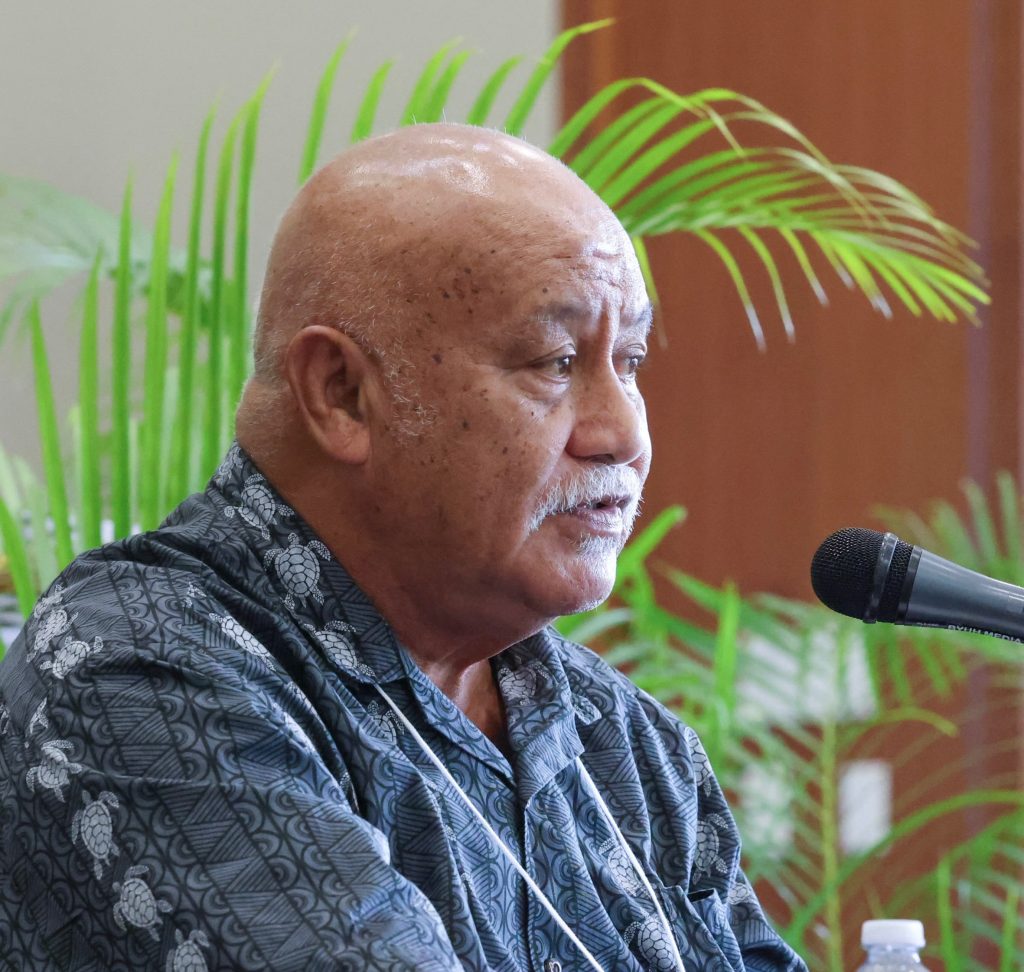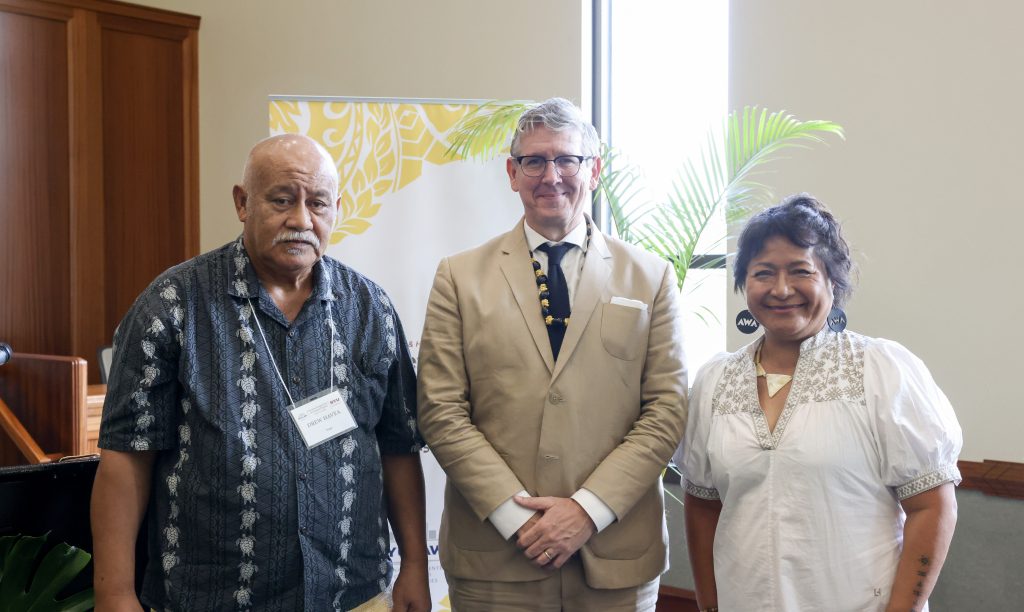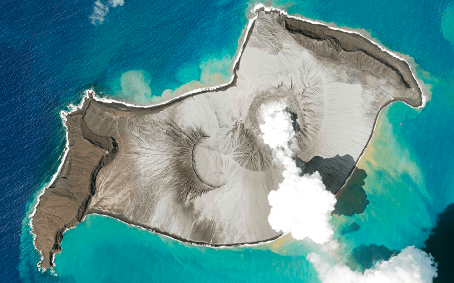
Siotame Drew Havea is board chairman of the Civil Society Forum of Tonga and a founding member of the Tonga National Youth Conference and the Tonga National Leadership Development Forum. This post is based on his remarks presented during the panel “Religion, Civil Society, and Human Dignity in Oceania” at the Oceanian Perspectives on Human Dignity Conference held at BYU–Hawaii in Laie, Oahu, Hawaii, 23–25 April 2024.
Human Dignity for All People
For many of us, human dignity from a religious perspective is grounded in our creation “in the image of God,” which motivates us with a liberating force to care for the sick, homeless, enslaved, and those who struggle for self-determination. We do not see God, but we are taught to have faith. Our understanding of God has been formulated from our family upbringing, our churches, and our cultural settings that connect us to the ecosystem of our society—our relationship to people and our relationship to our environment. We tend to interpret, in the glory of God, certain uniform characteristics of people whom we consider to be image bearers of God, and so we associate God’s image with people of power and status superior to us.
We deny respect and acknowledgement to those who, in our biases, “misrepresent” the image of God. We care for the sick and vulnerable member of our communities—but on our own terms. We selectively exclude from our care HIV/AIDS victims, drug addicts, sex workers, and sexual orientation minorities because we do not see them as representative of the image of glorious God. Those of higher status who live similar lifestyles receive empathy from us; we tend to find excuses within our cultural context to justify their behavior, including family and gender violence.
Civil society as development actors in our own right embrace human dignity from a transformational, inclusive, people-centered development approach that must be for all people—including gender and sexual orientation minorities, people with disability, children and young people, and migrant workers—with a strong focus on human rights at the forefront. This requires ensuring that decision-making and programs include not only the voices of the most marginalized but also a focus on addressing the systems and structural drivers of poverty, inequality, and injustice.
We have heard from earlier sessions of this conference about human dignity challenges and gaps within our society: the violation of human rights in domestic violence, school bullying of our children, sexual exploitation and human trafficking, and labor mobility workers with poor working conditions, to name a few. Our society—our governments with policies and legislation, United Nations agencies with the Universal Declaration of Human Rights, our politicians, our church leaders—all have good intentions to address human rights violations. But we are yet to see our communities brought to the table to codesign an approach that can work for all people.
If I were to propose an approach that can deliver on a common agenda to incorporate human rights and human dignity genuinely to progress our Oceania forward, it would be to invest time and resources on building a “culture of dignity.”

Building a Culture of Dignity
Every one of us is born with dignity, whether we are born with different forms of disability, socioeconomic status, communities, or families. Dignity is not something that one can transfer to someone else. Society can either respect dignity or snatch it away. Human dignity is much more than and beyond human rights; it speaks to the details of what we mean and demonstrate when we say that “life matters,” with a clear unconditional definition that helps reinforce a culture of dignity.
We struggle with human dignity in Oceania because human rights discourse has created fear that pursuing dignity will come at the cost of effectiveness across all different groups, who will demand specific preferences and choices. The competition for donor funding to advance human rights has further siloed marginalized groups. We have witnessed, for example, various communities fighting for their rights, including the disability community, women, and youth, to name a few. We tend to compete to place our vulnerability at the top of the priority lists of donors and UN agencies and miss the opportunity to unpack the roots of human dignity, which could dignify our internal systems, programs, processes, policies, cultures, and way of work—allowing civil society and the development sector to embrace the full humanity of those we seek to serve.
Building a culture of dignity can be done in many ways, so I would like to share some civil society experiences in Tonga:
Community principle–led leadership. In 2008, our government and country were involved in discourse about the type of government we would have in Tonga. Civil society actors set up a National Leadership Development Forum, to consult with the people about where the country was going. Political reform would bring new leadership; traditionally, leadership came from certain classes and groups, not from the community. A realization that anyone in the community could become a prime minister was unheard of.
With the potential of new leadership, we consulted every community in the Kingdom of Tonga and invited them to participate in the development of the Tonga National Leadership Code. The Code now serves as a community partnership framework that gives the community a leverage point to negotiate with government and development partners on community development projects. The Code includes the following fourteen guiding principles, to facilitate participation in the new political system[1]:
- Righteous living (Mo’ui Fakae’Otua)
- Love (‘Ofa)
- Honesty (Faitotonu)
- Respect/listening (Faka’apa’apa)
- Commitment/loyalty (Mamahi’ime’a)
- Relationships (Tauhi vaha’a)
- Equity (Vahevahe taau)
- Patience/endurance (Fa’a kataki)
- Accountability (Tali ui)
- Transparency (‘Ata ki tu’a)
- Trustworthiness (Falalala’anga)
- Vision (Mo’ui visone)
- Humility (Loto to)
- Health (Mo’ui Lelei Fakaesino)
Disaster response. As disasters become stronger in our region, we need to rethink our approach to disaster response in the context of the culture of dignity. The effects of the 2021–22 volcanic eruption of Hunga Tonga Hunga Ha’apai and accompanying tsunami were compounded by COVID-19. Those who usually would come to Tonga to offer support in response to disasters were no longer able to enter the country. This highlighted a need to localize disaster response.

When responders did come, in a rush to meet donors’ timelines, cash handouts became the norm for distribution. From our perspective, this did not contribute to dignity. So-called “dignity kits” brought in from UN agencies did not contain the things that bring dignity to those in need in the community. More than two years after the volcanic eruption and tsunami, a number of families displaced from their islands are still waiting to be relocated to their new homes. This is far from human dignity. Scientists estimate that the 15 to 25 centimeters of sea-level rise a year will bring loss and damage to many communities in low-lying islands in Oceania. By 2050, more than 20 communities in Tonga will be under water. Locally led relocation by communities needs to be empowered, to ensure relocation with dignity in the future.
One disaster response approach that worked in Tonga is “Dignity for Work,” exemplified by the “Cash for Crops” and “Cash for Weaving” humanitarian responses to Hunga Tonga Hunga Ha’apai. The 2021–22 disaster affected communities, from sea water overrunning their crops to ashfall from volcanic eruptions covering the whole island. Small family farmers shared concerns with civil society that their root crops needed to be harvested within two to three weeks after the tsunami or the sea water would turn the root crops inedible. Civil society then mobilized youth volunteers from affected communities to help farmers harvest and process the root crops. Civil society paid farmers “Cash for Crops” (i.e., the harvested cassava, taro, and yams), which provided food-relief distributions to tsunami-affected and relocated families.
The same principles were applied to “Cash for Weaving,” where civil society through conversation with relocated communities—especially women who were reluctant to participate in the psychosocial support provided by government—helped them refocus by doing their usual domestic activities such as weaving. Civil society provided weaving materials and bought the women’s final products of mats and ta’ovala. While the women were weaving, they started opening up to share their experiences of the tsunami, and they were able to participate in the psychosocial program that was realigned to fit the situation. The language of self-dependency, reciprocity, and dignity was reflected in these efforts.
Community engagement in sustainable development. Dignity takes long-term investment in community engagement that allows the building of mechanisms for participation, feedback, and proper training of genuinely grounded community leaders. In some situations, communities may need to resist and humbly challenge the development status quo. Localized systems already in place need to be strengthened with decentralized leadership councils that can be supported to embrace gender equality and youth representations. This will allow communities to have a say in what development should look like in their communities, to safeguard the dignity of their residents.
With lack of participation in the governance of communities, we witness a rise in cases of domestic violence. Communities are not aware of, and are not paying attention to, the following international instruments:
- Universal Declaration of Human Rights (UDHR, 1948)
- International Covenant on Civil and Political Rights (ICCPR, 1966)
- Convention on the Rights of the Child (UNCRC, 1989)
- International Covenant on Economic, Social and Cultural Rights (ICESCR, 1966)
- Convention on the Elimination of All Forms of Discrimination Against Women (CEDAW, 1979)
- Convention on the Rights of Persons with Disabilities (CRPD, 2006)
Tonga has not ratified the latter two Conventions.
We believe that responses, mediations, and resolutions relative to violence against women must be rooted in restorative justice and healing justice. Our current approach needs to be fixed. We need to listen to and value the voices of all individuals—in particular, those experiencing violence and vulnerabilities. We need to create a culture of well-being and create conditions that encourage and allow all individuals to thrive and reinforce their own and others’ rights to safety and well-being.
Political and economic dimensions of human dignity. There is no dignity in political participation and no budget integrity if there is no access to clean water, if people with disability lack access to quality education, and if other inequalities remain unaddressed. The empowerment of communities has occurred through Tonga’s Public Financial Management project—through simplifying the public finance system and developing a Citizens Budget Guide that provides an entry point for accessing Community Development Funds through Members of Parliament. The biggest issues facing our communities—from the escalating climate crisis to social injustice and poverty—are rooted in and shaped by our current economic systems, yet our communities are excluded from engaging in economic policy and unable to influence the economy around us.
Communities need to understand how the national debt will impact their children’s and grandchildren’s futures. When government looks at deep-sea mining as a revenue source to pay the national debt, people need to be consulted, as this could be the greatest graveyard for generations to come. Dignity is about ensuring a shared understanding and analysis of how economic systems work, to build the power of our communities and to create economic change and fairer, more sustainable alternative systems.
Human rights institutions are a mandated enabling environment for the voices of citizens to be heard and acted on in relation to human rights violations. Dignity is essential, but there are complicated tensions to navigate, especially when the role of the state is to safeguard the rights of its citizens. Oftentimes the need to change the social norms to ensure that one group’s dignity is protected may challenge existing power structures and traditions in ways that feel disrespectful to other groups in society. Access to information as part of the establishment of human rights institutions is highly recommended and, regionally, is widely absent.
The accompaniment of dignity. Dignity has been a term that has successfully rallied everyone around the longstanding discourse on human rights and responsibilities. Programs must be accompanied by practices that reinforce the need to listen to the wisdom of communities and take enough time to contribute to real change, which requires relationship-building, collective-visioning, and joint priority-setting, supported by facilitators who live full time in those communities. Dignity must accompany democracy so that decision-making power is widely decentralized, mechanisms for participation and accountability are available, socioeconomic inequality is reduced, and systems of oppression are dismantled—so that everyone has equal opportunity in life and operates within the natural and environmental limits of the earth.
Conclusion
Disadvantaged community groups in Tonga spent decades struggling for voice and representation. Of course, pursuits from below are always met with resistance from those situated higher in the political and social hierarchy. The principle of the culture of dignity is rooted in the concept of “Leave No One Behind.” At the same time, we need to adopt the principle declared by those living with disability: “Nothing About Us Without Us.” That is, those most affected by the decisions made about them must be consulted and represented. Agreeing to this principle is paramount. All people, without exception, must subscribe to the culture of dignity where human rights are protected from harm and abuse. The culture of dignity is identified by inclusivity and non-discriminate respect for everyone.
Mālō ‘aupito.
Reference:
[1] See Gov’t of Tonga, Ministry of Fin. & Nat’l Planning, Tonga Strategic Development Framework 2015–2025, at 42 (May 2015).
